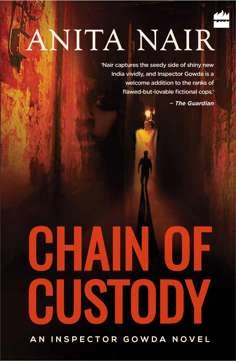
Indian writer Anita Nair uses crime fiction to explore child trafficking horrors
In Bangalore, children are being trafficked to work in begging cartels and the sex trade, and it’s this bleak world that Nair focuses on in her second Inspector Gowda novel

Subterfuge, manipulation, rage, hatred, unsuspecting folk who end up with their throats slit, the blood leaching into the expensive living room carpet, and a driven, deeply flawed individual determined to find out just whodunit. Good crime fiction assures the reader that there is order in the universe, that our existence has meaning, that things aren’t random after all, and that evil – usually inspired by a tawdry yearning to possess another man’s wife or steal your sister’s inheritance – can be overcome.
In a sense, crime fiction (and its subset, the detective novel), despite the generous spilling of blood and the focus on humankind’s violent core, is the most optimistic of literary genres, and the most reassuring. Nothing could be further from real life. Within the universe of the crime novel, karma exists, the guilty are caught out, and baffling knots are unravelled.
Of course, most good detectives are tortured souls, wracked by self doubt, even as they set out to find out who exactly wedged that knife in the victim’s back and why. While the murder in the remote community with only a limited number of unlikely suspects and the “locked-room” mystery with its baffling setting are terribly satisfying, detectives sometimes have to go out into the wide world and grapple with organised crime and its political backers, and confront social decay.
“Chain of Custody is the second one in the series I’m writing with Inspector Borei Gowda and this time I wanted to write about child trafficking because it hasn’t been written about enough,” says the Indian writer Anita Nair. “There is a serious problem and the racket is so synchronised it runs like a multinational company in terms of processes, so it is very difficult to pin it down to a person.”

Indeed, the subject of Chain of Custody was so grim that, halfway through, the author set the book aside to work on the much cheerier Alphabet Soup for Lovers. “The stories I was stumbling upon were so distressing, you feel hopeless; you feel everything is pointless. I had to stop for a bit. I needed something that didn’t require me to go into those horrible spaces,” she says.
Much of the material for the book came from NGO reports on the burgeoning demand for children in Bangalore’s begging cartels, sweatshops and the sex trade, and from conversations with social workers and victims. These included middle-class girls groomed on the internet and children raised in abject poverty lured with promises of employment.
“It was very grim. If I thought I was going to have fun with my crime series, this wasn’t fun,” says Nair. Still, she felt compelled to write a work of fiction based on horrific fact. “I thought of writing about trafficking in a way that it would be read by a larger number of people. It makes it palatable in a strange way because you can still kind of grapple with the thing that, maybe, this is fiction,” she says. “The truth is that every story I’ve described in this book is based on a real life story. The scary part of this is that it happens and exists.”
Some scenes are so dark that Inspector Gowda seems cheery in contrast. “In this book, he has a slightly different perspective on life. He’s become more patient and the presence of Urmila in his life is an antidote. He’s slightly easier on himself. Also, with a subject so grim I couldn’t have an inspector who is also grim,” Nair says.
Gowda’s character also helps the author to explore Bangalore, the frenetic pace of its growth, its transformation into one of India’s most dynamic cities, and its underbelly. The city is the real protagonist of the Gowda novels. “Much as I love him, Borei Gowda is ultimately an instrument for me to be able to carry this forward. Next, I might go back to a smaller theme but it would be something endemic to Bangalore,” says Nair, who might consider sending him to another city on a mission “which would allow me to take potshots at that place”.

